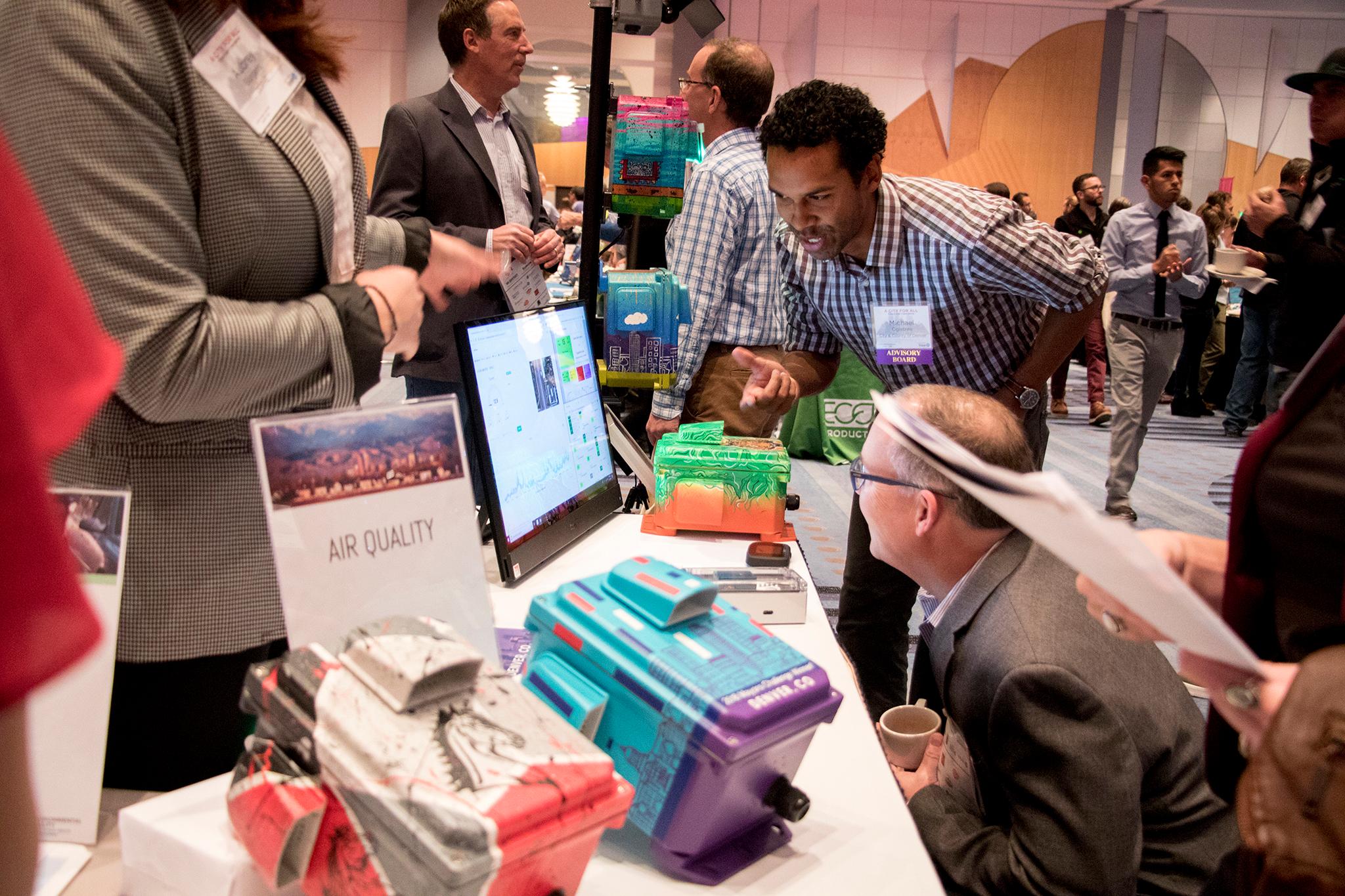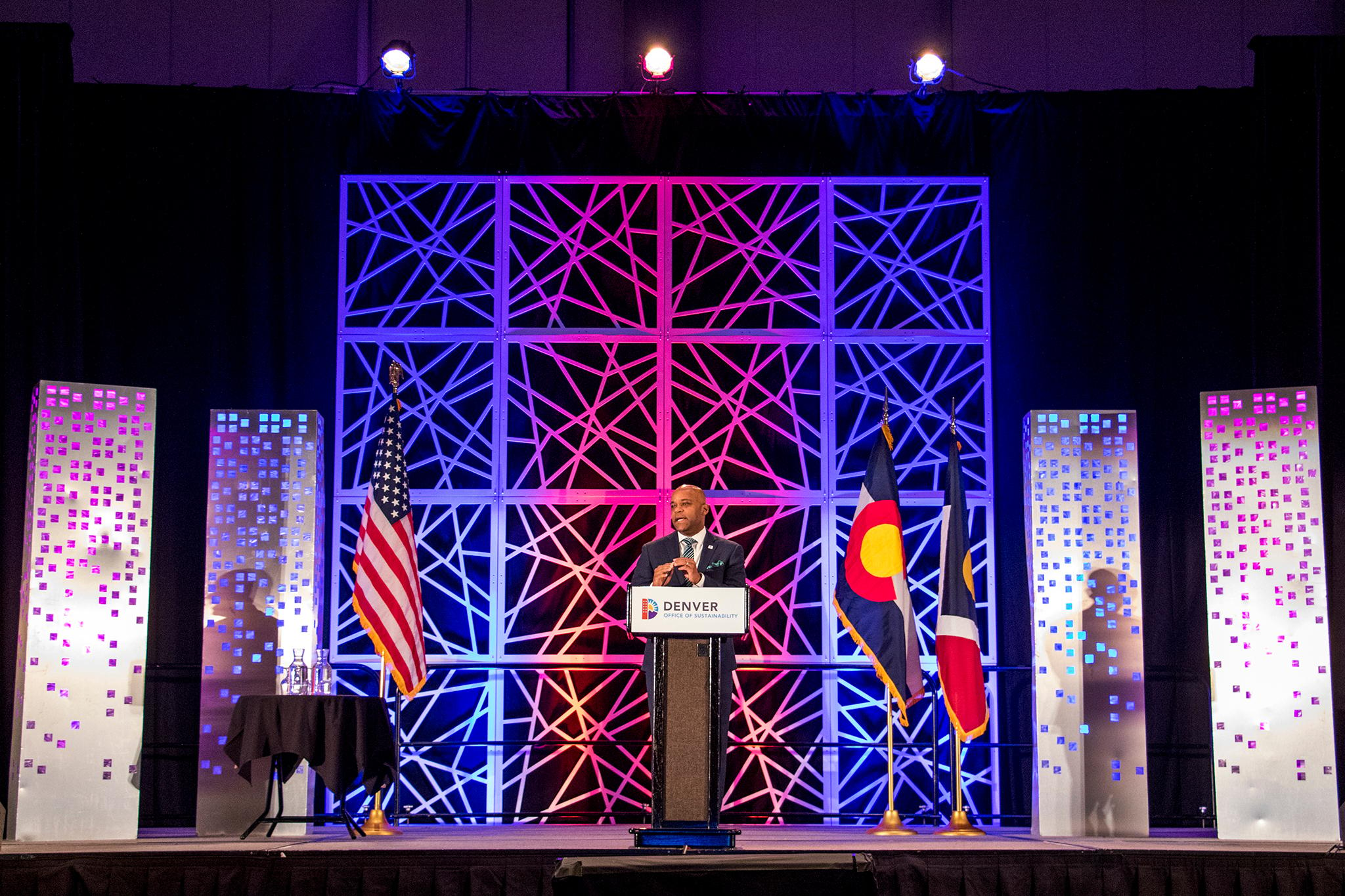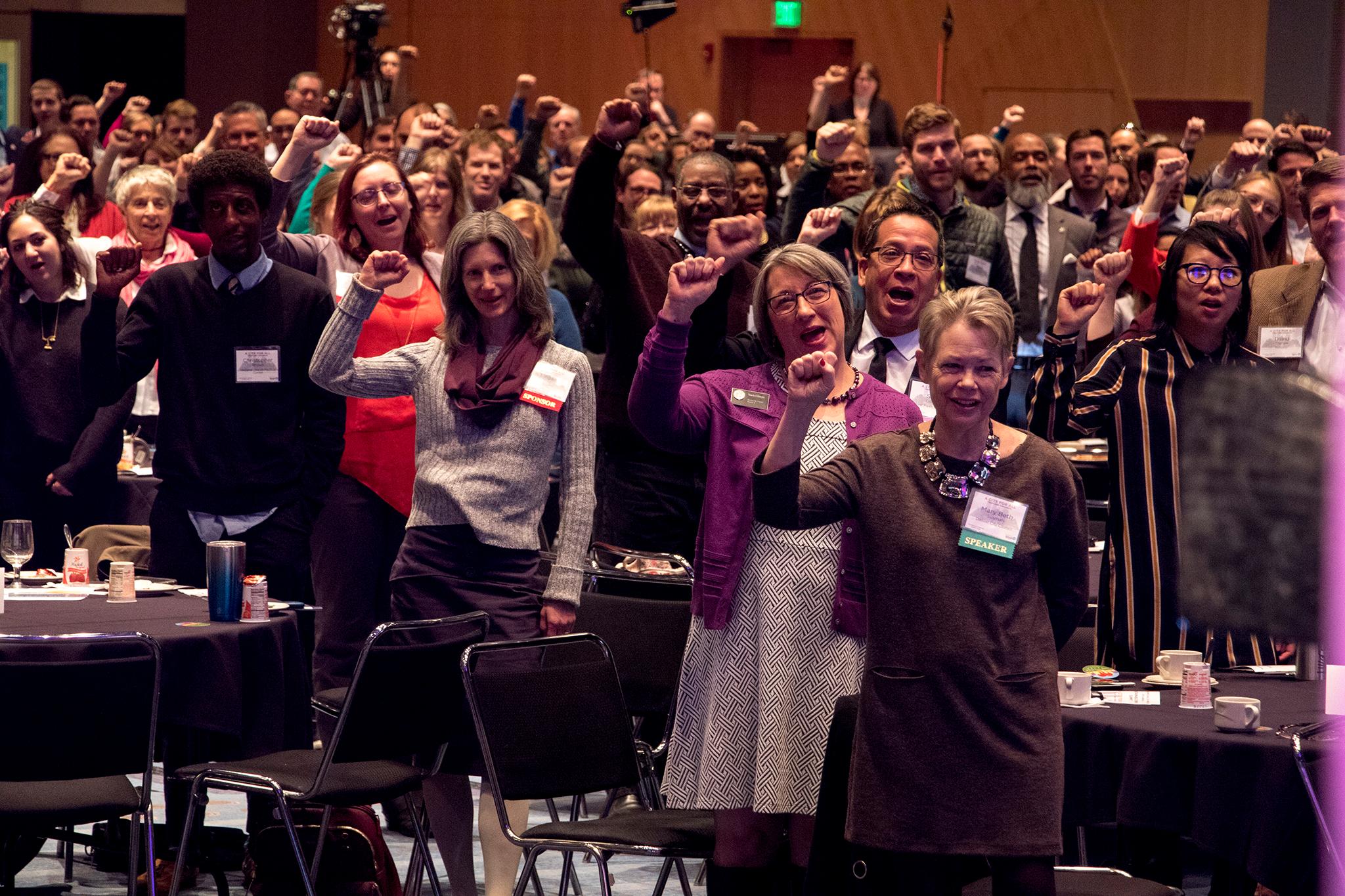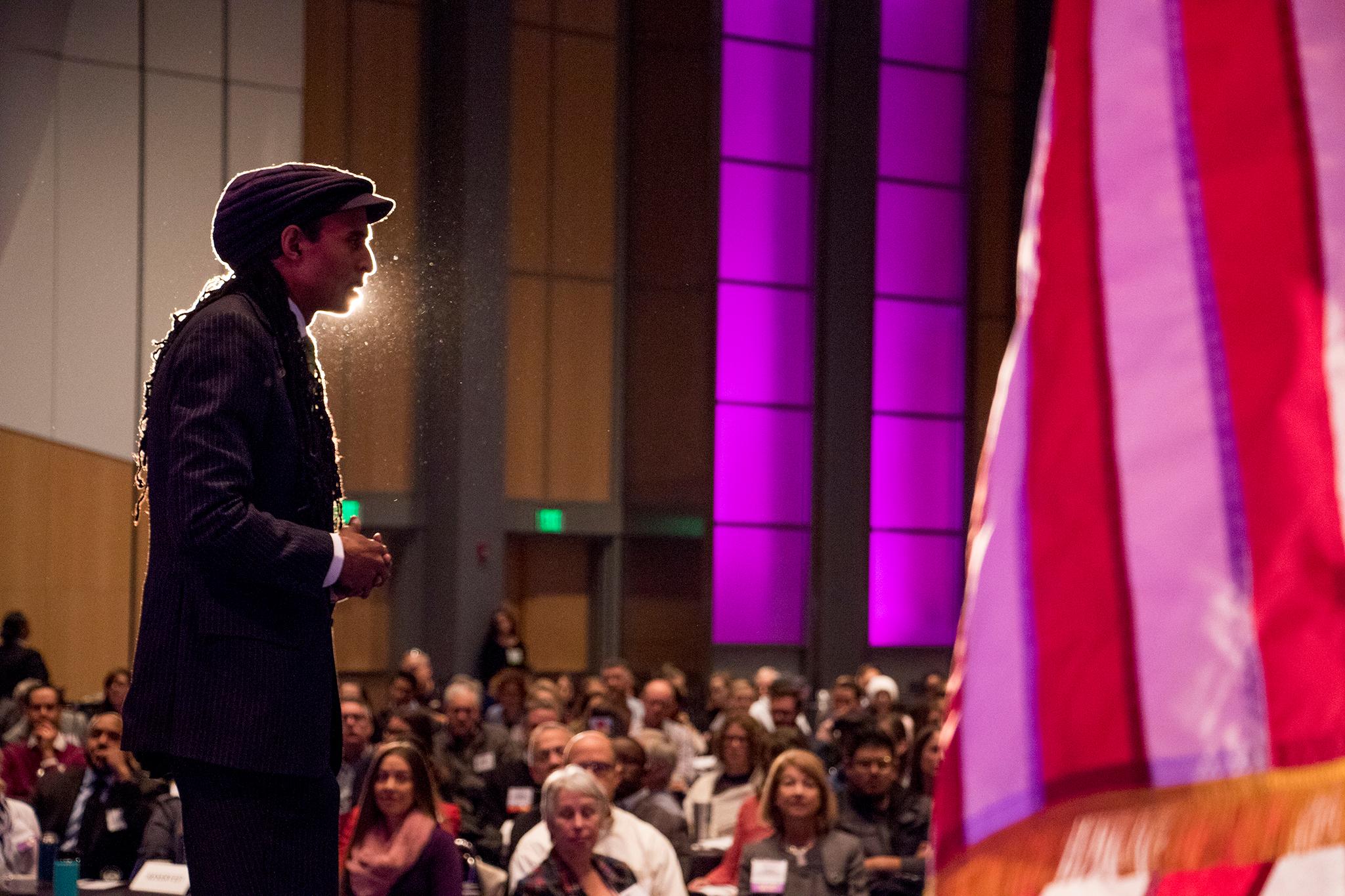About 800 people gathered at the Colorado Convention Center on Thursday to workshop answers to the countless questions facing the city and state around climate change and sustainability.
Polluted air from cars and buildings. Clean water shortages. Food waste. Dirty energy. Inequity. These issues rose to the top of Denver's concerns at the annual Sustainable Denver Summit on Thursday.
The summit, Denver's fourth since the Hancock administration launched the event, is a forum where the city government, businesses and nonprofits make commitments to environmental sustainability in the face of a presidential administration that's hostile to the idea. The city will reach some of its goals by the self-imposed 2020 deadline, according to Denver Chief Sustainability Officer Jerry Tinianow, but will miss the mark with others.
"I think we're in good shape, but we haven't really been tested yet," Tinianow said. "If you wait until the test comes and then work on these problems, you're gonna lose." By "test," Tinianow means an extreme drought or a gasoline shortage -- some kind of major, unexpected event.
President Trump's scorn for environmental regulation loomed over the summit.
"He says he'll trust his gut that climate change is not real," Hancock told the crowd, referring to the president's comments in the Washington Post. "That's a big gut."
Trump wants to remove America from the Paris climate accords, but sustainability experts say cities and states are positioned on the front lines of climate change. Denver and Colorado control their own fate, whether it's densifying to save energy, investing in transit, or solving food insecurity. Localities have to take that responsibility seriously, said Mustafa Santiago Ali, the summit's keynote speaker.
Ali is the vice president of climate, environmental justice and community revitalization for the Hip Hop Caucus and a former higher up at the Environmental Protection Agency during the Bush and Obama administrations. He left the agency shortly after President Trump took over.

"Anything that was sustainable, climate or environment related, they didn't see much value in it, and they didn't see value in it because it affected their paradigm of profit over people," Ali said in an interview. "So they were very focused on those who helped them to get into office and it didn't matter, the science that was there. It didn't matter, the examples from communities who had been able to make real change happen. Even if it meant jobs in the green space, they wouldn't prioritize it."
Ali pointed to the replacement of President Obama's clean power plan, weakening mercury regulations and weakening programs that protect kids from lead poisoning.
"For me it was about a lack of humanity and a lack of understanding of the impacts of what they were moving forward on," Ali said. "Unfortunately it was gonna make more people sick, and in some instances, was gonna take those people's lives."
Denver's on pace to meet a major climate goal.
The city aimed to bring dirty air particles down to 1990 levels -- no more than 11.8 million metric tons of carbon dioxide and equivalent pollutants per year.

Cars, buildings and other sources emitted 12 million metric tons last year and Denver's on pace to meet the goal, largely because Xcel Energy is ahead of schedule with converting coal to renewable energy like wind and solar.
The city already met its goal for preserving drinkable water (22 percent less usage than in 2001). And Tinianow says its on track to meet its "platinum" level walkable city goal in 2020 because of additional density and sidewalk construction.
But as of 2017, Denver had not met all national ambient air quality standards.
Our air meets most of Washington's standards, but ozone levels aren't up to snuff. The city won't meet its 2020 renewable energy goal, either, which aimed to cut fossil fuel use in half and bring total energy use down to 2012 levels.
Cars and a city built to serve them, a primary cause of climate change, mean Denver will probably fall short of its transportation objective. The Hancock administration wants no more than 60 percent of Denverites commuting by car. One year out, that figure is closer to 70 percent, according to statistics from the U.S. Census Bureau.
"We got a lot of work to do to really impact the culture of single occupancy vehicles. That's huge," Hancock said in an interview. "That's a lot of work, because we're transforming a culture and culture is the hardest thing to change. We're an automobile-centric city in Denver and so we have to continue to contribute to different modes of transportation."
Some projects in the pipeline support a cleaner city. Others don't.
The I-70 expansion will make driving more attractive and will generate more trips through the concept known as "induced demand," according to transportation experts at the Southwestern Energy Efficiency Project. It's being widened in mostly Latino north Denver neighborhoods whose residents already experience a higher rate of hospital visits for asthma and cardiovascular disease, according to Denver's public health department.
Denver does have new transit, walking and land use plans that call for a complete transformation of the transportation network -- many projects are funded, many are not. And Hancock committed to building 125 miles of bike lanes earlier this year.

The city should see climate and energy gains from a new law that mandates rooftop gardens or some combination of cooler "white" roofs, green space and solar panels.
Hancock guaranteed less trash and more dirt.
The city's recycling and composting rate sits at 22 percent. The 2020 goal is 34 percent.
Hancock said he wants to shift the "upside-down paradigm" of charging residents for composting while picking up trash for free.
"Currently the way it works is that trash is perceived as free because it's tied into the city's general fund, but we're paying for compost," said Madeline Keating, who works on reducing food waste at the Natural Resources Defense Council's Denver office. "When you're disincentivized to compost, there's no reason to compost, and therefore you throw everything in the trash. To flip that on its head, we should charge for trash and you make composting and recycling free."
The mayor wants to convert the city to a "pay as you throw" system, but not until his administration has secured all the equipment and is ready to administer the program. "That is something that I can tell you is on its way," he said, adding that the educating the public on its importance will be key.
"The proper paradigm is that you should not be paying for compost and recycling," Hancock said. "And if you are recycling and composting, the theory is you have very little waste going into the stream... and if you're doing what you should do with composting and recycling, there's not much to pay for in the trash stream."
In a city where one in five residents experiences food insecurity, Keating said Denver should focus on diverting perfectly good food to vulnerable populations, too. Food waste contributes to about 3 percent of the country's greenhouse gas emissions, according to Keating. "We can alleviate the food insecurity of the community and reduce food going to the landfill," she said.
The 2020 goals are not Denver's sole aspirations for the environment. The city has specific goals in place through 2050.
Correction: An earlier version of this story provided an incorrect full name for the NRDC. It is the Natural Resources Defense Council.













